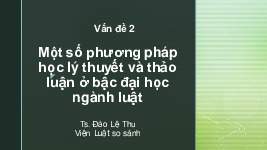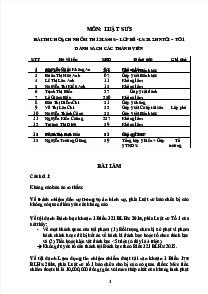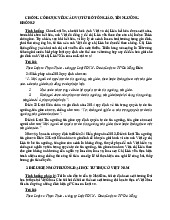





Preview text:
lOMoAR cPSD| 57855709 Research Article
Research on Chat GPT in the basic university education
system of Vietnam: advantages, disadvantages, and impact
on the improvement of academic performance for Hanoi Law University students. ARTICLE INFO ABSTRACT
Received: 15 May 2024 The integration of ChatGPT into university education is swiftly
Accepted: 22 May 2024 advancing, bringing about impacts that are largely unexplored. With its
impressive capabilities, it stands poised to revolutionize academic performance. This research
seeks to delve into the advantages, disadvantages, and overall impact of ChatGPT on school
tasks. Conducted as an exploratory qualitative study, data were gathered through semi-structured
interviews involving 40 participants from Hanoi Law University participated in semistructured
interviews to provide data. The findings highlight ChatGPT’s ability to provide quick and easy
access to a diverse range of content and pedagogical strategies. It proves useful for tasks such
as assessment, knowledge acquisition, and organizing school activities. However, the study
identifies eight associated disadvantages: the ease of access to information may encourage
plagiarism and foster academic dependence, potentially hindering the development of crucial
skills like inquiry, argumentation, analysis, and critical thinking. Moreover, there’s a risk of
students misusing information, resorting to cheating in their assignments, which could
compromise the quality and integrity of their work, making traditional educational tools less effective.
Keywords: ChatGPT, benefits, drawbacks, academic assignments. BRIEF INTRODUCTION
School assignments play a vital role in the learning process, aiding in the assessment of
students’ comprehension while nurturing critical and analytical skills (Cooper, 2007; MengChun
et al., 2020). However, the integration of artificial intelligence, exemplified by applications like
ChatGPT, is revolutionizing learning methods. This shift prompts a reevaluation of educational
approaches. ChatGPT, a language model-based AI, is gaining traction in education due to its ability
to generate coherent and contextually relevant text. Its utilization poses both positive and negative
aspects, as discussed in previous studies. While it enhances productivity, concerns regarding
security, privacy, and ethical considerations have been raised. Some educational institutions have
restricted access to ChatGPT due to worries about plagiarism and misinformation dissemination.
Despite its potential benefits for material design, ethical dilemmas persist. The widespread use of lOMoAR cPSD| 57855709
ChatGPT in the learning process underscores the necessity of examining its impact on academic
performance, including its advantages and disadvantages. LITERATURE Chat GPT REVIEW
Chat Generative Pre-Trained Transformer (ChatGPT) is a natural language processing model
with 175 billion parameters that can provide conversational answers to user input. Using a modified
version of the well-known Transformer network, Chat GPT is a natural language processing (NLP)
model that produces text responses that resemble those of a human. It can comprehend human
language patterns and generate compelling writing since it has been taught on a vast amount of text
data. Other NLP models could have tight behavior and output, or very limited modification. In
contrast, ChatGPT allows users to further customize its responses and behavior. This strong and
innovative NLP model is perfect for applications that need realisticsounding text and conversational
interactions. It is a useful tool for a variety of applications due to its adaptability and customisation.
All things considered, ChatGPT is an exceptional and potent natural language processing model
that works well for applications that need natural-sounding text production and conversational
exchanges. It is a useful tool for many different applications since it provides a great level of
flexibility and customization.
The application of Chat GPT in students learning
AI has the potential to be a helpful tool for students if used appropriately. AI can identify areas
where students might be struggling and provide tailored solutions to help them achieve. All data
processing tasks that take humans days to perform can be completed by it in a matter of seconds.
AI can help level the playing field for students who might not have access to the same resources as
their peers. By employing Chat GPT, which enables students from disadvantaged circumstances to
receive the same degree of individualized attention and help as those from wealthier settings, the
achievement gap can be overcome. It’s important to keep in mind that not every educational issue
can be resolved by AI. Ensuring that children receive a well-rounded education that prioritizes
critical thinking, problem-solving, and teamwork is still the duty of educators and administrators.
While artificial intelligence (AI) has its uses in education, it cannot replace human connection and
engagement, which are necessary for meaningful learning to occur. involvement and
communication, which are necessary for actual learning to occur. Students may benefit from its
capacity to create content fast and effectively. But the chance that students would become unduly
dependent on this technology calls into question how well their own skills are being developed. This
puts the integrity of the basic education system at danger because one of the most crucial tactics
teachers employ is the assignment of school tasks, sometimes referred to as research assignments
or tasks. In the past, assignments have required students to conduct research by looking through
books, articles, journals, etc. with the goal of producing summaries, syntheses, and interpretations,
among other things. They then give textual or visual presentations of their products in an effort to
encourage subject learning and the development of work habits, dedication, and accountability.
Effect of Chat GPT on academic performance
Academic performance describes the degree of success a student exhibits in their pursuit of
knowledge. Cumulative grade point average (CGPA), a grading system used in educational lOMoAR cPSD| 57855709
institutions to quantify a student’s overall academic achievement in a certain period, usually a
semester, indicates the objective measure of a student’s academic performance. The proper
application of ChatGPT insights by students might enhance their comprehension of a subject and
hence improve their academic achievement. However, it could negatively impact their academic
achievement if they only use ChatGPT instead of making the necessary efforts, exercising critical
thinking, and conducting independent research. The development of critical abilities and the breadth
of information needed for academic achievement can be hampered by an over-reliance on outside
resources, including generative AI technologies, in the absence of active learning and human interaction. METHODOLOGY Design
The study employs an exploratory qualitative research methodology to delve into the impact of
the ChatGPT phenomenon in basic education, addressing its advantage, disadvantage and its
influence on academic performance. Following a grounded theory approach, the researchers aim
to develop theories grounded in the data collected from surveys. Conducted within an educational
setting where schools have not enforced restrictive policies on ChatGPT integration, the research
explores an environment where university students in Hanoi Law University freely utilize various
technological resources for their school tasks. Participants/Samples
This sample received a total of 40 responses equivalent to 40 students of Hanoi Law University
- the leading school in university education specializing in the Faculty of Legal Foreign Language
course 48. The participants had experienced various technology tools, especially Chat GPT
applications. Hence, they definitely have enough knowledge and qualifications to join our survey. Instrument
The base survey questions included: What are the potential challenges that the learning process
encounters with the availability of Chat GPT for students? What learning opportunities do you
envision with Chat GPT? In some cases, it was necessary to ask follow-up questions to obtain
more complete answers, such as: Can you provide specific examples of how Chat GPT might
positively or negatively influence learning? How do you think students could use Chat GPT to
bypass a deep understanding of topics? How could Chat GPT facilitate the understanding of
complex concepts through information visualization? or could you explain why you believe certain
school tasks should be eliminated due to the emergence of Chat GPT? CONCLUSION
The integration of ChatGPT into university education offers significant benefits in assisting
students. It provides a swift and convenient way to access information, saving considerable time
for learners alike. Moreover, its diverse content aids in planning learning sessions and assessments.
Acting as a supportive platform, ChatGPT can generate various pedagogical strategies, including
personalized ones, and aids in knowledge confirmation and task scheduling. However, it presents
challenges and risks that require responsible handling. The ease of accessing information may lOMoAR cPSD| 57855709
encourage plagiarism, undermining critical skills like inquiry and critical thinking. There’s a
concern that students may misuse ChatGPT, resorting to cheating on assignments and diminishing
the quality of their work. This necessitates clear guidelines and policies from school administrators
and teachers on its ethical use, focusing on academic integrity, student privacy, and information security.
Students should design activities fostering creativity and critical thinking, complementing
ChatGPT with active pedagogical approaches. Comprehensive assessment methods are needed to
evaluate not just knowledge but also higher-order skills, reducing the likelihood of plagiarism.
Monitoring mechanisms are essential to analyze ChatGPT's impact on learning and pedagogical
practices. While the study reflects the views of students with certain limited exposure to ChatGPT,
future research should involve broader samples to enrich perspectives. It lays the groundwork for
further research to explore ChatGPT’s integration into university education, emphasizing the
importance of ethical use and its impact on students’ cognitive and social development.
Longitudinal studies are crucial for understanding ChatGPT’s evolving influence on learning over time. REFERENCES
Alarcón-Llontop, L., Pasapera, S., & Torres-Mirez, K. (2023). The ChatGPT application: Initial
perceptions of university teachers. In Proceedings of the LACCEI International Multi-Conference
for Engineering, Education and Technology. https://doi.org/10.18687/LACCEI2023.1.1.336
Alser, M., & Waisberg, E. (2023). Concerns with the usage of ChatGPT in academia and medicine: A viewpoint. American Journal of Medicine, 9, 100036.
https://doi.org/10.1016/j.ajmo.2023.100036
Aristovnik, A., Umek, L., Brezovar, N., Keržič, D., & Ravšelj, D. (2023). The role of ChatGPT in
higher education: Some reflections from public administration students. SpringerLink, 1974,
254263. https://doi.org/10.1007/978-981-99-8255-4_22
Barredo, A., Díaz-Rodríguez, N., Del Ser, J., Bennetot, A., Tabik, S., Barbado, A., Garcia, S., GilLopez,
S., Molina, D., Banjamins, R., Chatila, R., & Herrera, F. (2020). Explainable artificial intelligence
(XAI): Concepts, taxonomies, opportunities and challenges toward responsible AI. Information
Fusion, 58, 82-115. https://doi.org/10.1016/j.inffus.2019.12.012
Baskara, R., & Mukarto, M. (2023). Exploring the Implications of ChatGPT for language learning in
higher education. Indonesian Journal of English Language Teaching and Applied Linguistics, 7(2), 343-358.
Carrasco, A. (2023). Reinventando la enseñanza de la historia moderna en secundaria: La utilización
de ChatGPT para potenciar el aprendizaje y la innovación docente [Reinventing the teaching of
modern history in secondary schools: The use of ChatGPT to enhance learning and teaching
innovation]. Studia Historica: Historia Moderna [History Studies: Modern History], 45(1), 101145.
https://doi.org/10.14201/shhmo2023451101146
Chamorro-Atalaya, O., Olivares-Zegarra, S., Sobrino-Chunga, L., Guerrero-Carranza, R., Vargas-
Diaz, A., Huarcaya-Godoy, H., Rasilla-Rovegno, J., Suarez-Bazalar, J., & Poma-Garcia, J. (2023).
Application of the chatbot in university education: A bibliometric analysis of indexed scientific lOMoAR cPSD| 57855709
production in SCOPUS, 2013- 2023. International Journal of Learning, Teaching and Educational
Research, 22(7), 281-304. https://doi.org/10.26803/ijlter.22.7.15
Chatterjee, J., & Dethlefs, N. (2023). This new conversational AI model can be your friend,
philosopher, and guide ... and even your worst enemy. Patterns, 4(1), 100676.
https://doi.org/10.1016/j.patter.2022.100676
Cooper, H. (2007). The battle over homework: Common ground for administrators, teachers, and
parents. Sabio. https://doi.org/10.4135/9781483329420
Cotton, D., Cotton, P., & Shipway, R. (2023). Chatting and cheating: Ensuring academic integrity in
the era of ChatGPT. Innovations in Education and Teaching International, 61(2), 228-239.
https://doi.org/10.1080/ 14703297.2023.2190148
Currie, G., & Barry, K. (2023). ChatGPT in nuclear medicine education. Journal of Nuclear Medicine
Technology, 51(3), 247-254. https://doi.org/10.2967/jnmt.123.265844
Dwivedi, Y. K., Kshetri, N., Hughes, L., Slade, E. L., Jeyaraj, A., Kar, A. K., Baabdullah, A. M.,
Koohang, A., Raghavan, V., Ahuja, M., Albanna, H., Albashrawi, M. A., Al-Busaidi, A. S.,
Balakrishnan, J., Barlette, Y., Basu, S., Bose, I., Brooks, L., Buhalis, D., …, & Wright, R. (2023).
Opinion paper: “So what if ChatGPT wrote it?” Multidisciplinary perspectives on opportunities,
challenges and implications of generative conversational AI for research, practice and policy..
https://doi.org/10.1016/j.ijinfomgt.2023.102642
García-Peñalvo, FJ, Llorens-Largo, F., & Vidal, J. (2024). La nueva realidad de la educación ante los
avances de la inteligencia artificial generativa [The new reality of education in the face of advances
in generative artificial intelligence]. RIED-Revista Iberoamericana de Educación a Distancia. [Ibero-American Journal of Distance
Education] https://doi.org/10.5944/ried.27.1.37716
Gates, B. (2023). La era de la IA ha comenzado [AI era has begun]. Gatesnotes.
https://www.gatesnotes.com/The-Age-of-AIHas-Begun
Ghafouri, M. (2024). ChatGPT: The catalyst for teacher-student rapport and grit development in L2
class. System, 120, 103209. https://doi.org/10.1016/j.system.2023.103209
Jarrah, A. M., Wardat, Y., & Fidalgo, P. (2023). Usar ChatGPT en escritura académica (no) es una
forma de plagio: ¿Qué dice la literatura? [Using ChatGPT in academic writing is (not) a form of
plagiarism: What does the literature say?] Revista en línea de tecnologías de la comunicación y los
medios, 13 (4), e202346. https://doi.org/10.30935/ojcmt/13572
Rajabi, P., Taghipour, T. Cukierman, D., & Doleck, T. (2023). Exploring ChatGPT’s impact on
postsecondary education: A qualitative study. In Proceedings of the Western Canadian Conference
on Computing Education. ACM. https://doi.org/10.1145/3593342.3593360
Kukliansky, I., Shosberger, I., & Eshach, H. (2016). Science teachers’ voice on homework: Beliefs,
attitudes, and behaviors. International Journal of Science and Mathematics Education, 14(1),
229250. https://doi.org/10.1007/s10763-014-9555-8
Paranjape, K., Schinkel, M., Nannan Panday, R., Coche, J., & Nanayakkara, P. (2019). Introducción a
la formación en inteligencia artificial en la educación médica [Introduction to artificial intelligence training in medical education]. JMIR Med. Educativo, 5(2), e16048.
https://mededu.jmir.org/2019/2/e16048/
Lancaster, T. (2023). Artificial intelligence, text generation tools and ChatGPT–Does digital
watermarking offer a solution? International Journal for Educational Integrity, 19, 10.
https://doi.org/10.1007/s40979-023- 00131-6 lOMoAR cPSD| 57855709 RECOMMENDA
When using ChatGPT in education, students should apply the following approaches to maximize its benefits:
- Information lookup and answer search
- Discussion and opinion exchange
- Assistance in problem solving and assignment - Learn from reliable sources
- Develop critical thinking and evaluation skills



